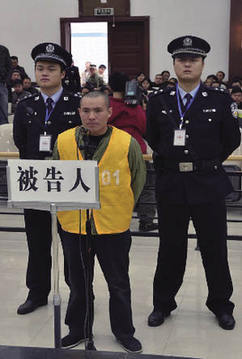| No Leniency on Organized Crime and Corruption
CHONGQING has become an engine of development in southwestern China since it was designated a municipality under direct jurisdiction of the central government in 1997. Falling prey to the temptation to make exorbitant profits quickly, some people adopted violence to monopolize the market, forming an underworld of criminal forces reaching into important economic sectors. Criminal organizations have strict hierarchical structures and division of labor among their members: some carry out killings and robberies, some handle money laundering under cover of legitimate activities, and still others gather economic intelligence and "gray information," or bribe officials to obtain protection. Sweeping them away was going to require some serious "new brooms."
 |
|
On November 19, 2009, the Ran Guangguo criminal clique was on trial in Chongqing. |
Chongqing in Action
In order to restore normal economic order and safeguard the legitimate rights and interests of the people, the Chong- qing police started a crackdown on organized crime and corruption in June 2009. By October 25, they had laid 2,328 criminal charges, arrested 2,915 suspects, eradicated 14 major criminal gangs, and sealed and frozen the proceeds and assets of the dirty dealing, amounting to US $260 million.
Sensational exposure of more than 200 judicial cadres under investigation for their involvement in the underworld included more than ten at the bureau or deputy-bureau level, such as Wen Qiang, former executive deputy chief of the Chongqing Municipal Public Security Bureau and chief of the Judicial Bureau, Peng Changjian, former deputy chief of the Chongqing Municipal Public Security Bureau, and Zhang Tao, former vice-president of the Chongqing Municipal Higher People's Court.
Two figures were decisive in the campaign against these socially corrosive forces. In 2007 Bo Xilai, former Minister of Commerce, was transferred to Chong-qing Municipality, serving as secretary of the CPC Chongqing Municipal Committee. He immediately started straightening out the official rank and file. He presided over the change of top officials in seven districts and counties under the jurisdiction of Chongqing Municipality, bringing a number of corrupt officials to justice. After that, he transferred Wang Lijun, then deputy mayor of Liaoning's Jinzhou City and chief of the Jinzhou Municipal Public Security Bureau, to Chongqing.
Wang Lijun has been engaged in police work for more than 20 years. Back in Liaoning, he was famed in police circles as an "anti-underworld hero" for sweeping away local forces of evil. After he was transferred to Chongqing, he replaced Wen Qiang to serve as the executive deputy chief of the Public Security Bureau, and later was named chief of the Chongqing Municipal Public Security Bureau, igniting the fuse on Chongqing's anti-underworld campaign.
Chinese netizens use the phrase "Chongqing renaissance" to express their glee at the massive clean up that ensued. Guo Songmin, a current affairs commentator, wrote in an article: "The greatest fruit the CPC Chongqing municipal committee and Chongqing municipal people's government have harvested from this crackdown is heightened prestige, which is one of the most important administrative resources of any government." An article entitled "Crackdown on the Underworld according to Laws and Eradicating Social Malignant Tumors" on the Xinhuanet.com read, "Chongqing's cleanup of civic vice sends a positive signal to the general public, that tolerance of criminal subclasses is zero. The government does not allow any person or any force to trample on laws, undermine social order, or infringe on the people's interests." An article in Liaowang (Outlook) Weekly commented, "Crackdown on the underworld and evil forces is a systematic project calling on comprehensive resources of a political, economic, social and cultural nature, to eradicate not just the weeds of the corruption but the soil they thrive in."
|
